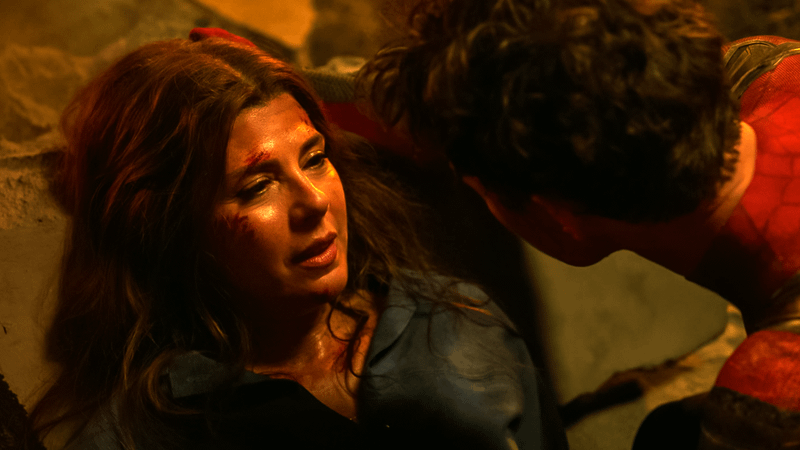
Marvel Studios’ Multiverse Saga has been quite the departure from its Infinity Saga, and one change that it has brought upon the Marvel Cinematic Universe is featuring women more prominently, both on- and off-screen.
While the Infinity Saga had few female leads, the Multiverse Saga has given characters like the Scarlet Witch the spotlight and introduced many new ones like Yelena Belova and Kamala Khan.
However, the franchise still has some work to do when it comes to its use of women, as evidenced by how Secret Invasion handled the return of Agent Maria Hill.
The Life & Death of Maria Hill

Maria Hill, played by Cobie Smulders, first appeared in The Avengers back in 2012. In the movie, audiences see her working for SHIELD, mainly interacting with Nick Fury and delivering expository dialogue.
She doesn’t get much to do in terms of action scenes either (those are mainly reserved for the titular Avengers), but seeing as there were so few female characters in the MCU up to that point other than Black Widow and a handful of love interests for the male heroes, it was nice to see her involved in the Battle of New York, even if it wasn’t on the frontlines.
Up until Secret Invasion, the first Avengers film remained Maria Hill’s most prominent appearance in the MCU apart from Agents of SHIELD.

She shows up in all of the Avengers movies, teases the heroes at a party in Age of Ultron, gets Blipped by Thanos in Infinity War, and attends Tony Stark’s funeral in Endgame. Her biggest role after The Avengers is in Spider-Man: Far From Home helping out Peter Parker, only for the film’s post-credits scene to reveal that she was, in fact, a Skrull (Soren, who is the wife of Talos and is killed off-screen before the events of Secret Invasion, to be precise) for presumably the entire movie.
When Smulders was confirmed to be returning as Hill for Secret Invasion, it seemed like the character might finally get some long-overdue development. However, the creators had other plans.
Her purpose in the show is purely for Nick Fury’s character arc; she warns him that danger could be ahead if he didn’t stay on top of his game and is proven right about this at the end of the first episode when she is shot and killed by a Skrull disguised as Fury himself.
With that, Maria was the latest in a relatively long line of MCU characters to become a victim of “fridging."
The History of Fridging Explained

The term fridging is shorthand for “women in refrigerators," a trope referring to a female character being killed purely for the sake of furthering a male character’s arc. The name actually refers to another story from the world of superheroes, a 1994 Green Lantern comic tale in which the titular character’s girlfriend, Alexandra DeWitt, is murdered by the villainous Major Force, who subsequently stuffs her corpse into a refrigerator.
The story from which fridging got its name was far from the first example of the trope; it’s been going on in storytelling for years. In order for a character’s death to count as an example of it, they must be female and their death must only serve to advance a male character’s story (if it does that but also serves a purpose for a woman’s arc - including the one dying - it doesn’t count).

They do not need to be a love interest (though many often are); the point is that their death proves their character is only there for the sake of the male ones, not to have an arc of their own.
Fridging being common enough for it to become a named media trope highlights how male-centric a lot of mainstream media is and how many female characters only exist to serve the arc of the men in the story at hand.
While there are male characters in media who exist to serve female-centric stories in similar ways, they are far less common, and the term fridging therefore only refers to women who are killed off in this manner, not men.
MCU's History of Fridging

The MCU is far from the only movie franchise to utilize the fridging trope, but it notably has done so with a fairly high frequency.
Both MCU movies that came out in 2013 fridge female characters, with Maya Hansen dying in Iron Man 3 to further motivate Tony Stark to take down the Mandarin and Frigga’s death in Thor: The Dark World serving to bring Thor and Loki back together as brothers and become a team to deal with Malekith.

The most prominent example of fridging in the MCU occurs about halfway through Avengers: Infinity War. Gamora takes Thanos to the location of the Soul Stone, and it turns out to be a cliff on the planet Vormir. They are then told that in order to obtain the stone, one must sacrifice what they love most. Thanos throws Gamora off the cliff to her death, gaining the Soul Stone for his Infinity Gauntlet.
This one is particularly glaring because Gamora isn’t an ancillary character like the other aforementioned women; she’s the second-biggest character in the first two Guardians of the Galaxy movies. Dying in this manner doesn’t work as completing an arc of her own in any way (unless one counts agreeing to take Thanos to the Soul Stone to save Nebula from torture as some sort of “culmination” of their reconciliation story) and only serves to affect the audience’s feelings toward Thanos.
There’s been debate over whether these feelings are meant to be an intensification of disliking the villain or complications in their feelings toward him in that making this sort of sacrifice “humanizes” him in some way, and the latter would certainly raise a lot more issues in the treatment of women in the MCU.

The other major instance of MCU fridging is Aunt May’s death in Spider-Man: No Way Home. Aunt May falls somewhere between Maya Hansen and Frigga’s fairly small roles and Gamora’s status as a franchise co-lead, playing an increasingly large part in each MCU Spider-Man movie.
Over the course of the movies, she discovers Peter’s secret, has a relationship with Happy Hogan, and inspires Peter to always do good and serve others. Her death in No Way Home is interesting because it has a sort of honorable side to it as she says the classic “with great power…” line traditionally uttered by Uncle Ben (who is never mentioned in the MCU). But, unfortunately, this is undoubtedly a case of fridging as it serves as a low point for Peter and not much else.
Black Widow Does It Better

It’s important to keep in mind that not every female character's death is an example of fridging, even one that emotionally affects and motivates a male character. The key to being able to tell is generally whether it is part of a character arc of their own or not, and one big example from Marvel Studios of a woman’s death that serves said woman’s story first and foremost is that of Natasha Romanoff aka Black Widow.
In Avengers: Endgame, Black Widow and Hawkeye arrive on Vormir in 2014 to obtain the Soul Stone only to discover that in order to do so one of them must sacrifice that which they love most. It just so happens that these two have an extremely close friendship - probably the closest out of all the Avengers - and what follows is an emotional, high-stakes fight in which they both attempt to sacrifice themselves so the other can live.

Ultimately, Natasha is the one who wins out in the end, and it’s clear she sees this as a way of finally wiping out the “red in her ledger” which has haunted her throughout her entire MCU journey up until this point. While Clint, the other Avengers, and presumably most viewers don’t see this sacrifice as necessary for Natasha to make up for what she did as an assassin in the past nor to prove herself as a true hero, this is the right thing to do in her mind, putting the agency in her hands and making her sacrifice serviceable to her story first and foremost.
It’s the antithesis to Gamora’s death on Vormir in Avengers: Infinity War, and while this well-done death of a female lead doesn’t redeem that iffy one, it’s nice to know that Marvel Studios has the ability to kill off its female leads in a thoughtful and respectful manner.

This is a case in which more mourning from the male characters would have been welcome (since all of the other original Avengers are men) as it felt like the movie moved on from Natasha’s death fairly quickly and never got back to honoring her at the end as it did with Tony Stark. However, these issues are different from fridging, and Natasha Romanoff’s death in the MCU certainly was not an example of it.
Marvel Studios & Fridging Moving Forward

The MCU has come a long way in its treatment of female characters; there was once a rule that there could be no lead female heroes and no female villains in the franchise (relegating most of the prominent women to the role of “love interest”), and by the end of the Infinity Saga, both of those things happened.
The Multiverse Saga has a much closer ratio of male- and female-led projects, most of them bringing in many new girls and women as heroes and villains. The diversity of the MCU’s women has also expanded considerably, both in terms of background and looks as well as personalities; no longer do the ladies have to be stoic and serious, there is plenty of room for them to be quirky, funny, and flawed.
But the franchise is still falling into pitfalls in handling its female characters from time to time, the frequency of the fridging trope being the most prominent. Killing off a female character to further a male one’s story isn’t inherently a bad thing, but it’s so common in media that doing so just adds to the huge pile of examples of the trope. It is a pile so high that it showcases how often women are viewed as just being present for the benefit of men, something that has been an issue in real life in addition to fiction.
While there's still a chance that Hill is not actually dead, the "Special Guest Star" credit for Smulders seems to imply that she's been killed for real. This is something that Smulders herself seems to echo - which is disappointing considering how much potential the character had to be explored and how her comic counterpart has gotten much more of a spotlight over the years.
The bottom line is that the MCU's Maria Hill deserved better, and Marvel should work harder to avoid the refrigerator in the future.












